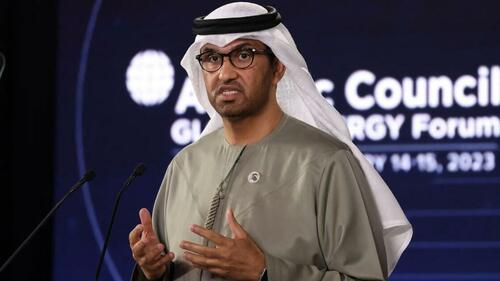
...lawmakers claim oil executives like Jaber are seeking to undermine climate change efforts...
Over 100 members of the US Congress and European Parliament signed a letter calling for Sultan Ahmed al-Jaber to be removed as the head of the upcoming COP28 climate conference, Reuters reported on 24 May.
COP28 will be hosted by the United Arab Emirates (UAE) in December and will center around efforts to mobilize $100 billion of public and private climate finance for developing economies.
Jaber, who heads the Abu Dhabi National Oil Company and serves as the UAE’s climate envoy, was designated in January to lead the talks.
In the public letter, lawmakers, including US Democratic senators Bernie Sanders and Elizabeth Warren, voiced “profound concern” that oil companies would be able to “exert undue influence” on the climate negotiations.
Addressing US President Joe Biden, European Commission President Ursula von der Leyen, and the UN, the letter stated, “We urge you to … engage in diplomatic efforts to secure the withdrawal of the president-designate of COP28.”
On the European side, the signatories hailed mostly from green political parties, which have exercised increasing influence over the continent’s energy policies, perhaps most prominently in Germany.
Germany’s Green Party has been losing support as its energy policies move forward, increasing energy costs and threatening Germany’s energy intensive industrial economy.
Energy costs have risen in part due to efforts to shut down both the coal and nuclear energy industries, while supporting sanctions against Russia due to the Ukraine war which have blocked imports of cheap Russian natural gas.
An effort to mandate the installation of expensive heat pumps in homes in the place of gas and oil heating systems as well as a proposal to ban combustion-engine cars as of 2035, have also been unpopular.
Meanwhile, Sultan al-Jaber called for a major boost to public and private finance for the climate change project in Africa.
At the African Development Bank 2023 Annual Meetings in Sharm El Sheikh, Egypt, Jaber said that Africa has “huge potential for low-carbon growth and sustainable development.”
“But one critical challenge stands in its way – and that is the lack of available, accessible, affordable finance. And this lack of finance is putting the world’s climate goals and Africa’s sustainable development at risk,” he said, according to UAE news agency Wam.
“Cop28 is exploring additional mechanisms to supercharge the flow of private finance to Africa.”
Jaber called on developed nations to come through with the $100 billion in climate finance they pledged more than a decade ago.
However, Axios notes that some view such efforts as “green colonialism,” as “rich nations preemptively cut off desperately poor countries from the cheap fossil fuels that helped make them rich in the first place.”
“This is already leading to harmful policies that will hurt millions of poor Africans by slowing down their continent’s economic development while doing little, if anything, to help fight climate change,” wrote Todd Moss and Vijaya Ramachandran in Foreign Policy.
…lawmakers claim oil executives like Jaber are seeking to undermine climate change efforts…
Over 100 members of the US Congress and European Parliament signed a letter calling for Sultan Ahmed al-Jaber to be removed as the head of the upcoming COP28 climate conference, Reuters reported on 24 May.
COP28 will be hosted by the United Arab Emirates (UAE) in December and will center around efforts to mobilize $100 billion of public and private climate finance for developing economies.
Jaber, who heads the Abu Dhabi National Oil Company and serves as the UAE’s climate envoy, was designated in January to lead the talks.
In the public letter, lawmakers, including US Democratic senators Bernie Sanders and Elizabeth Warren, voiced “profound concern” that oil companies would be able to “exert undue influence” on the climate negotiations.
Addressing US President Joe Biden, European Commission President Ursula von der Leyen, and the UN, the letter stated, “We urge you to … engage in diplomatic efforts to secure the withdrawal of the president-designate of COP28.”
On the European side, the signatories hailed mostly from green political parties, which have exercised increasing influence over the continent’s energy policies, perhaps most prominently in Germany.
Germany’s Green Party has been losing support as its energy policies move forward, increasing energy costs and threatening Germany’s energy intensive industrial economy.
Energy costs have risen in part due to efforts to shut down both the coal and nuclear energy industries, while supporting sanctions against Russia due to the Ukraine war which have blocked imports of cheap Russian natural gas.
An effort to mandate the installation of expensive heat pumps in homes in the place of gas and oil heating systems as well as a proposal to ban combustion-engine cars as of 2035, have also been unpopular.
Meanwhile, Sultan al-Jaber called for a major boost to public and private finance for the climate change project in Africa.
At the African Development Bank 2023 Annual Meetings in Sharm El Sheikh, Egypt, Jaber said that Africa has “huge potential for low-carbon growth and sustainable development.”
“But one critical challenge stands in its way – and that is the lack of available, accessible, affordable finance. And this lack of finance is putting the world’s climate goals and Africa’s sustainable development at risk,” he said, according to UAE news agency Wam.
“Cop28 is exploring additional mechanisms to supercharge the flow of private finance to Africa.”
Jaber called on developed nations to come through with the $100 billion in climate finance they pledged more than a decade ago.
However, Axios notes that some view such efforts as “green colonialism,” as “rich nations preemptively cut off desperately poor countries from the cheap fossil fuels that helped make them rich in the first place.”
“This is already leading to harmful policies that will hurt millions of poor Africans by slowing down their continent’s economic development while doing little, if anything, to help fight climate change,” wrote Todd Moss and Vijaya Ramachandran in Foreign Policy.
Loading…





